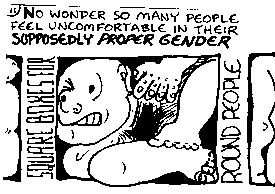Hi there visitor
Transnational Spansexual Foundation presents
Sex: Beginning to End.
The Origins of Sex
The sexes are not poles apart.
To use a global analogy, perhaps they are on either side of the equator, but the equator is just an imaginary line.
Why then did humans invent the notion of there being two distinct, stereotyped and exclusive types of humans, male and female?
For convenience.
As a simple shorthand map of the world, that may occasionally be useful, but somewhat less so when the map is mistaken for the territory.
It's a result of one major way our brains operate, that being to organise and classify. It's not the only way our brains operate, although classical authorities who have deified linear logic to the exclusion of all other tools of intelligence may have given that impression.
None the less, we find it useful to classify and stereotype. For example, as toddlers, we may burn our hand on one fire, and jump to the conclusion that all fires burn. This stereotype assumption saves us from burning our hand on other fires.
However, this tendency to stereotype also makes it easy for us to say such things as "All polka-dot people are lazy," or, "All green people are bastards," or other generalisations that interfere with fairness and therefor efficient operating in society. Perhaps if we were taught as children that as humans we are all unique and of equal value, we wouldn't be so quick to classify and stereotype.
Stereotyping is useful when applied to dangerous situations to avoid repetitions. It is counter-productive, however, when it prevents us doing what we're best at, adapting to new situations (and each human encounter is a particularly unique situation).
As kids, we may find that our friends' mothers feed us much as our own does. We reach a useful stereotype assumption about the relative chances of being nourished by bigger mother-like humans compared to father-like humans. Some may find this assumption one that works all their life. Others may find it prudent to reassess the usefulness of this part of their reality-map as their role changes from dependent child to more self-sufficient adult.
Never the less, we're told that the difference between male and female humans is a real thing, not just an assumption that serves us well in some circumstances but not others. We usually learn this when we're too young to protest, for we depend on the adults around us to survive, and disagreeing with them may mean risking starvation or physical assault. Whether the risk is real or imagined is irrelevant.
Why did authority figures teach us that we had to fit into set roles, that humans must be categorised into divisions such as boy/girl, ruling class/working class, Catholic/ Protestant, our race/not our race?
Part of it comes from the organisational tendencies of our brains, which I mentioned at the beginning of this chapter. Part of it, however, and the reason authorities are so loathe to give up the principle of division, is that division is necessary for power domination.
In order to have the rulers and the ruled, it is necessary to sort out who "us" and "them" are.
Indeed, the word "sex" comes to us from the Latin "seco", meaning "to divide." It is the same root as such words as "sect," "section," and "secede".
Anthropologists tell us that in some societies, there was/ is no power domination, but rather power-sharing. Observers of contemporary society tell us that it too is now moving towards power-sharing rather than power-dominance.
Centuries ago, in Ancient Greece, when people were debating the structures that would become the foundations of Western Civilisation As We Know It, hierarchies were all the rage. In order to have power-domination, it was necessary to classify people into "men" and "women", "citizens" (for males of privileged bloodlines) and "slaves", the rulers and the ruled. Power domination further requires everyone to know where they fit into the hierarchy, who the "archon" (leader) is, who's second-in charge, who's next in line, and so forth.
Perhaps it was once useful to know who was going to grabbed the spears in defense against the attacking sabre tooth tiger, and who grabbed the children and rushed them to safety, without a debate about gender roles. But times have changed, and inflexible gender roles are now more of a hindrance than a help.
A hundred years ago, the distribution of power hadn't changed much from the Paleolithic era. Women were still denied the right to vote. Those women who claimed the right to vote were criticised for trying to be like men, and therefor acting unfemininely. They were told that if they wanted the right to privileges reserved for men, they were not "real women".
Not so long ago, it was the mainstream view that a women who didn't marry and have children was not being a "real woman". Women who did marry were forced out of the public service. In this century, people were still separated on race lines, with some races not being allowed to vote. This was the case until a few decades ago with blacks in South Africa, and with aboriginal people in Australia. "
Divide and conquer" is still a popular method of oppression.
Divide and Conquer
Power domination not only makes it necessary to divide "us" from "them", but also divides us within. This division is essential, for if we realise that ultimate authority comes from within us, how can we be made to obey others or the rules made by them?
Western philosophers divided the individual into "body", "mind", and "spirit". This is essential for power-domination to work, for if any individual is allowed to access spiritual authority directly, why should they need the Priest or King or Pope? Individuals who access divine pleasure and knowledge through their bodies likewise pose a threat to "authority". Thus, we were taught that our "mind" was superior to our "body", and must be in control of it, and our mind had to obey spiritual authority as represented by the pope/ king/ priest/ or other outside "authority". The word "individual" literally means 'that which cannot be divided", which highlights the folly, the hubris, of it's division.
Never the less, we are told that our intellect must always be in control of our instincts and intuitions .
Power-domination finds it necessary to divide us from the wisdom and power of our own bodies, particularly of our genitals. We are told from a very early age that our genitals are unclean, "dirty", "rude". We probably learned that any pleasurable sensation from our genitals was only acceptable in particular circumstances approved by society. The Pope tells us that this is in a Church (and state) sanctified monogamous heterosexual relationship where procreation is a possible result.
We are divided also from any part of us that does not fit our presumed gender role.
This makes us easier to control. It makes it easier to fit into marketing strategies, for politicians and advertisers.
It allows us to fit into the hierarchical structures necessary for power-domination, either as the oppressors or the oppressed.
In fact, we are usually both, for even at the top of the pyramid we must obey the rules.
Even the head honcho is obliged to abide by rules that others have made. The Queen and the Pope are denied from masturbating, or from admitting that they do. Even they and the rules of their succession are governed by sex.
We are all divided from each other and from ourselves by power-domination.
Nobody wins.
Let's play a different game.
Beyond Division.
The Chinese symbol of Yin and Yang teaches us that both are part of the same thing, that both are within each other.
The words "Yin" and Yang" mean respectively "the sunlit side of the mountain and "the shadowed side of the mountain". The sunlit side and the shadowed side change places as the day progresses. There is not one without the other; they are simply two aspects of the same thing. There is not such a separate unchanging thing as "Yin" or "Yang". They are simply two aspects of the mountain. What is, what exists, is the mountain.
Yin and Yang are always dynamically changing, and which is which depends on the relative position of the observer.
Driven by the need to divide (essential to power domination), Western philosophers and scientists have promulgated the idea that there is such a thing as "objective reality". Now, however, even scientists bound by the mode of Western science are having to admit it's impossible to separate the observer from the observed, for they affect each other.
I'll give a simple example from quantum mechanics, the study of the basic physical structure of the universe, at the subatomic level where it's not clear what is solid particle matter and wave pattern energy. Whether light appears to be a particle or a wave depends on how the observer chooses to look at it.
Let's take another example: Scientists trying to work out the position of a sub-atomic particle. To make a record of things in the larger scaled world, we can photograph the light they emit (for example, in the case of stars), or we can observe the light they reflect (in daylight photography), or we can bounce light off them (as with flash photography). With subatomic particles, another particle can be bounced off the particle we wish to observed. The resulting impression may be recorded on a kind of photographic plate. However, the impact of the particle bouncing off the one we wish to observe changes the position, speed and/or direction of the observed particle. In other words, the act of observation affects the thing observed. There is no objective reality. Reality is subject to the observer. In other words, "reality" is always subjective.
The division of the universe is useful only as a tool, for constructing our "maps" of reality that allow us to deal with it. If we want to accept reality as it actually is, we must accept that there is no intrinsic division in it. "Man" is not separate from part of "nature", "Yin" is not separate from "Yang", "masculine" is not separate from "feminine".
This is being recognised by businesses, who are now encouraging workers to operate in both "Yin" and Yang" ways, compared to the old doctrine of competition being superior to co-operation.
Healers and therapists are working more and more in wholistic ways that recgonise the interconnectedness of everything, mind and body, "animus" and "anima" (as Jungian psychologists label the "masculine" and "feminine" parts of our minds).
The future is beyond division.
Ultra sex.
click to visit the
main index
or visit these other pages in this site:
 Bi-Gendered:
an alternative to polarised or exclusive genders
Bi-Gendered:
an alternative to polarised or exclusive genders
words and pictures, male
and female: tranys in comic books
ALL PAGES ON THE ULTRASEX SITE ARE COPYRIGHT,
BUT PERMISSION IS GIVEN FOR FREE REPRODUCTION (THAT IS, FREE=
NOT FOR PROFIT) PROVIDED THE SUBSTANCE REMAINS INTACT AND THIS NOTICE
IS INCLUDED IN ANY REPRODUCTION. THIS MATERIAL IS PUBLISHED BY THE TRANSNATIONAL
SPANSEXUAL FOUNDATION ON THE ULTRASEX SITE
Linked notes
Readers interested in thinking are referred to any book by Edward de Bono, particularly Lateral Thinking. [click to return to text)
Fritzjov Capra's book The Turning Point is highly recommended here for anyone interested in a broad view of how society's paradigms (belief structures) are changing. [return to text]
Decartes and his Cartesian Dualism were major perpetrators here. [return to text]
"Intuition" means "inner teaching" [return to text]
In Taoist terms, "energy" would be seen as "Yang", "matter" as "Yin". That light is both, with the percieved aspect chosen by the observer, is a perfect illustration of the Yin/Yang concept. Let us look at human affairs in this light (to coin a phrase). Whether one individual or culture sees something as "masculine" or "feminine" is determined by the observer. The observed thing is not intrinsicaly one or the other. [return to text]
It's not, strictly speaking, a phographic plate, since it may be particles other than photons (light particles) that are used, but the idea is the same. [return to text]
Fritjov Capra's book The Tao of Physics goes into this in greater mathematical and scientific detail. I recommend it to hard science buffs, but even most average readers like me will be be able to get the gist of it. [return to text]

